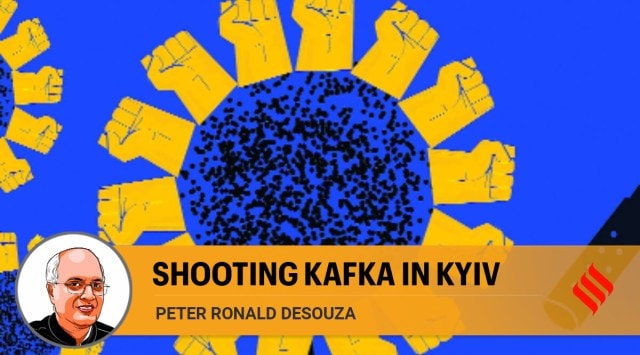
In a voice that was decisive but also carried a thin hint of nervousness, he tried to end the conversation with “Okay, I’ve listened to you”. But she persisted. “Who are you? What are you doing here?” He had a menacing Kalashnikov in his hands. She had only a packet of sunflower seeds. She was wearing her regular black coat, the sort you wear when you go to the farmer’s market in winter. He was in his army fatigues, the modern kind that has pockets everywhere to carry munitions. He spoke with the certainty of military orders. She with the certainty that comes from moral outrage. The video of their conversation in Kyiv has gone viral.
She: Who are you? … Are you Russians?
He: Yes
She: What are you … (expletive deleted) doing here?
He: This conversation won’t lead to anything
She: You’re occupiers! You’re fascists! You came to our land. Why did you come here with weapons?
He: We… who said
She: Take these seeds, so sunflowers grow when you die here.
He: This conversation won’t lead to anything. Let’s not make things worse. … Please.
She: How could we make this situation any worse?
He: Please let’s not make things worse.
She: Guys put these seeds into your pockets. Take these seeds. You will die here with them. You’ve come to my land.
He: Okay I’ve listened to you.
She: Do you understand? You’re occupiers
He: Ok
She: You’re enemies
He: Yes
She: From now on, You’re cursed.
He: Yes
Listening to the conversation, I was immediately reminded of the powerful and evocative essay by Nobel laureate Heinrich Böll, ‘The Gun was aimed at Kafka’. I had read it four decades ago but still remember the scene he so vividly describes. Set in 1968, in spring when the Soviet tanks had rolled into Prague, Böll describes a fleeting encounter in the city square between a woman and a soldier. The young soldier stood beside his tank whose gun turret was aimed at the statue of Kafka. His colleague sat inside the tank, looking out at the world from the open hatch. A woman was walking by. There was both urgency and hostility in her gait. She had a dog on a leash. She looked straight ahead as if the tank was invisible, as if to make it invisible. The young soldier tried to humanise the situation and bridge the distance between occupier and occupied by bending down to pet the dog. In most situations, such gestures of friendship always work. This time the dog growled at him, a “do not come any closer or I’ll show you” growl. It seemed as if the woman’s hostility had travelled down through the leash to her dog. The soldier was taken aback. He was embarrassed because he did not know what else to do. They do not teach you the next steps in military school and he was too young to understand the ideology of occupation. He was only following orders. It was a small dog. He was a big man. But he backed off even though he had a tank with him.
The conversation between the soldier and the woman in Kyiv reminded me, once again, of the absurdity and tragedy of war. Yudhisthira’s truth. There was pathos in the exchange. The soldier, his finger on the trigger saying “please” twice to the angry woman, beseeching, even imploring her “not to make things worse”. She, oblivious, or rather unmindful of the danger of his finger on the trigger, offers him a packet of sunflower seeds, telling him that the life that is within them will surely come out, will sprout on his grave. She curses him. Almost stoically, he accepts her curses. Was she just speaking in anger? Was she being prophetic about the future of Ukraine? Is she denouncing war everywhere? Is she speaking as the mother of a soldier? Do curses work?
But apart from the bizarreness of this Kafkaesque situation, where normalcy has been upended and immense suffering has become widespread, where terrified children cower with their mothers in underground shelters, I tried to make sense of the absurdity from the perch of some future historian. Are we witnessing, in Ukraine, the death throes of an autocracy? Is this history’s cruel lesson that when autocracies die they do so in insanity and with the blood of innocents spilt? Is the tragedy playing out in Ukraine autocracy’s death rattle?
Obviously, the Russian leadership had not read Heinrich Böll. Pointing the gun a second time at Kafka just does not make any sense. But will egotistical leaders ever learn or do they think that they are the gifted ones in history who will get it right?
This column first appeared in the print edition on March 18, 2022 under the title ‘Shooting Kafka in Kyiv’. The writer is the DD Kosambi Visiting Professor at Goa University, India. Views are personal.